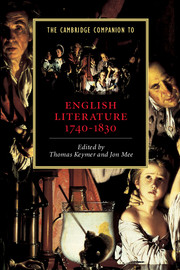Book contents
- Frontmatter
- Part I Contexts and modes
- Part II Writers, circles, traditions
- 8 Richardson, Henry Fielding, and Sarah Fielding
- 9 Johnson, Boswell, and their circle
- 10 Sterne and Romantic autobiography
- 11 Blake and the poetics of enthusiasm
- 12 ‘Unsex’d females’
- 13 The Lake School
- 14 Jane Austen and the invention of the serious modern novel
- 15 Keats, Shelley, Byron, and the Hunt circle
- 16 John Clare and the traditions of labouring-class verse
- Index
- Series list
14 - Jane Austen and the invention of the serious modern novel
from Part II - Writers, circles, traditions
Published online by Cambridge University Press: 28 May 2006
- Frontmatter
- Part I Contexts and modes
- Part II Writers, circles, traditions
- 8 Richardson, Henry Fielding, and Sarah Fielding
- 9 Johnson, Boswell, and their circle
- 10 Sterne and Romantic autobiography
- 11 Blake and the poetics of enthusiasm
- 12 ‘Unsex’d females’
- 13 The Lake School
- 14 Jane Austen and the invention of the serious modern novel
- 15 Keats, Shelley, Byron, and the Hunt circle
- 16 John Clare and the traditions of labouring-class verse
- Index
- Series list
Summary
To Caroline Spurgeon, Shakespeare scholar, 'every scrap of information and every ray of light on Jane Austen are of national importance' - an assertion which might be completed by G. K. Chesterton's observation that 'Jane Austen, of course, covered an infinitely smaller field than any of her later rivals [the Brontë sisters and George Eliot]; but I have always believed in the victory of small nationalities'. Spurgeon was writing in 1927, Chesterton in 1913, and between them stretched the 'Great' War of 1914-18. Jane Austen, too, was a wartime writer whose perspectives and philosophies can, with justice, be described as determined by Britain's wars with revolutionary and Napoleonic France, a backdrop against which her short adult life was lived. In thinking about how and why certain works of literature gain status as cultural capital (as 'Literature'), war as the real test of value has always been important. By the same argument, literary history (the practice by which we discuss, enforce, and occasionally revise the traditional curriculum of works that form the literary canon) is itself inseparable from the formation of nations and nationalities through the recognition and celebration of collective practices and shared accomplishments which distinguish 'us' from 'them'. We write our own history – the history of our particular moment in cultural and personal time – across the body of the works we read and, in recent times, repackage as texts in other forms – screenplay, audio-cassette, even the slogan across tee-shirt or coffee mug.
- Type
- Chapter
- Information
- The Cambridge Companion to English Literature, 1740–1830 , pp. 244 - 262Publisher: Cambridge University PressPrint publication year: 2004
- 3
- Cited by

